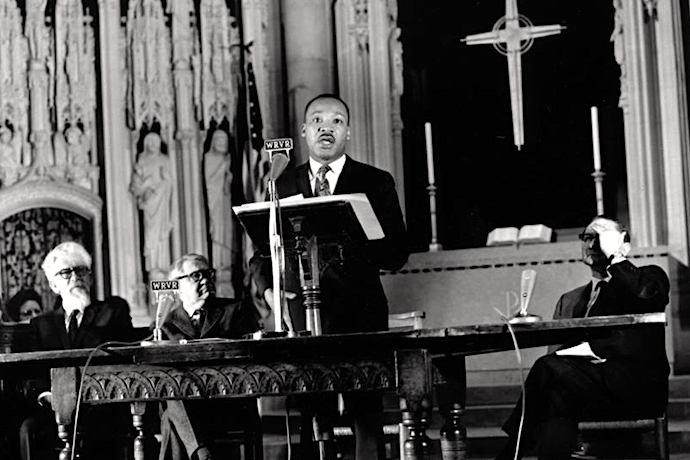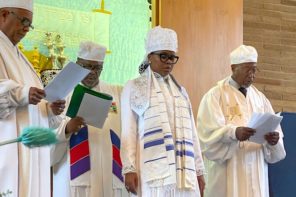Fifty-four years ago—on April 4, 1968—Martin Luther King, Jr. was assassinated in Memphis.
Exactly one year earlier—on April 4, 1967—Dr. King created a huge furor by coming out strongly against the Vietnam War before a packed crowd at New York’s Riverside Church. For the remaining months of his too-short life, King poured himself into an effort to forge an interracial movement among the poor, whose cause had been abandoned by a Lyndon Johnson determined to prevail in a hopeless and immoral war. King knew he would be killed, and he also knew that his “disloyalty” in challenging the war and calling for a thoroughgoing transformation of values would be the underlying reason.
For many this is ancient history, irrelevant to the lives they live now. But for others who understand the stakes, that Riverside speech still points the way to the only possible human future: one in which human beings matter more than property and profits, one in which we finally reckon with the catastrophic costs of militarism and racism, and one in which each of us is liberated from a violence so pervasive that we may not even see it.
For the keepers of King’s dream, both young and old, violence is the common thread uniting racial and economic and patriarchal oppressions. It’s a violence rooted in the 500 years of colonialism and white supremacy that shaped and still shape the deformed culture we all inhabit.
White people may not see the violence, but they feel it at what we might call the amygdala level: in the struggle to get ahead in a winner-take-all culture, in the toll that struggle takes in damaging personal relations and susceptibility to addictions, in the deference shown to “superiors” and the contempt directed toward people further down in the pecking order.
For many others, the violence of the American caste system is only too visible in the form of militarized policing and racist mass incarceration; brutal housing and educational segregation; 330 million guns in private hands; and the rotten pay and conditions of the jobs most US workers are compelled to take in order to survive.
Martin King saw clearly, and way ahead of his time, how violence had become—and still remains—normalized in a society experiencing what he called “spiritual death.” He saw how white Americans, having originally put shackles and manacles on the bodies of others, also put shackles and manacles—and blinders—on themselves.
Those who still share King’s vision are on a mission to open eyes and hearts to the core problem of violence and the promise of nonviolence. For the fifth year in a row, an amalgam of civil and human rights organizations and committed individuals calling itself the April 4 Coalition has organized regional and national events aimed at renewing awareness of King’s critique and leveraging that awareness for restorative action on a range of fronts: salvaging basic voting rights, avoiding environmental collapse, dismantling the prison-industrial complex, and building up a culture of peace at both the micro and macro levels. (Full disclosure: I serve on the Coalition’s planning team.)
This year the Coalition has enlisted over 50 organizations to co-sponsor April 4 activities, including the Poor People’s Campaign, Bill McKibben’s Third Act, and dozens of faith-based groups ranging from the National Council of Churches and the Religious Action Center of Reform Judaism to the Unitarian Universalist Association, the Council on American Islamic Relations, and the National Religious Campaign Against Torture.
On Monday April 4, at 7:15 pm EDT—and beginning with a pause for reflection during the hour in which Dr. King was murdered—the Coalition will host a virtual gathering featuring notable artists and activists performing a staged reading of the King speech along with a live roundtable conversation on the contemporary implications of his searing critique. People who register for the gathering can interact with the panelists.
King’s close associate, the 93-year-old civil rights icon Rev. James M. Lawson, Jr., will introduce the gathering with his own profound critique of America’s “plantation capitalism” and its hypocrisy in claiming to support democracy abroad while denying it at home. Lawson will also close the program with this clarion call to overthrow oppressive systems and build a society where everyone—including Earth itself—can thrive.
A Call for April 4th from Nehemiah Strakovsky on Vimeo.
The question, of course, is the one that Rev. Lawson raises in his distinctive way: Will white people who consider themselves “comfortable” awaken to the call? Can they see how the pathway to their own liberation lies in joining a mobilization for the whole human family?
Everyone says it’s easier for the young to push for a total transformation—that they have “less to lose.” My thought is that anyone, of any age, who looks honestly at the way we live now will welcome a decisive break. We as a whole people have nothing to lose, and everything to gain, on the road to beloved community.





